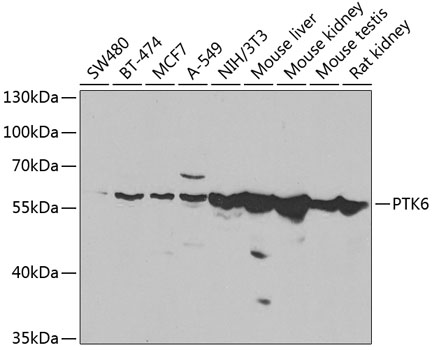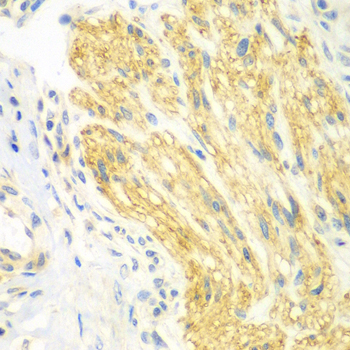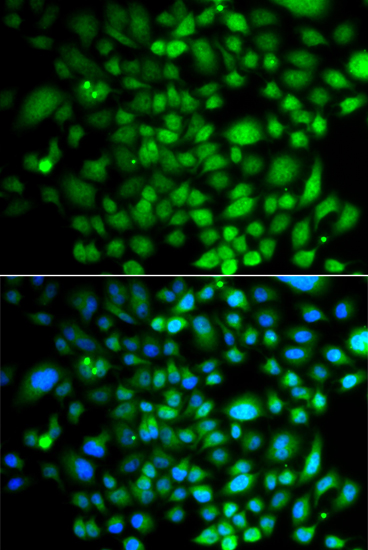Cell Biology Antibodies 11
Anti-PTK6 Antibody (CAB7497)
- SKU:
- CAB7497
- Product Type:
- Antibody
- Reactivity:
- Human
- Reactivity:
- Mouse
- Reactivity:
- Rat
- Host Species:
- Rabbit
- Isotype:
- IgG
- Antibody Type:
- Polyclonal Antibody
- Research Area:
- Cell Biology
Description
| Antibody Name: | Anti-PTK6 Antibody |
| Antibody SKU: | CAB7497 |
| Antibody Size: | 20uL, 50uL, 100uL |
| Application: | WB IHC IF |
| Reactivity: | Human, Mouse, Rat |
| Host Species: | Rabbit |
| Immunogen: | Recombinant fusion protein containing a sequence corresponding to amino acids 222-451 of human PTK6 (NP_005966.1). |
| Application: | WB IHC IF |
| Recommended Dilution: | WB 1:500 - 1:2000 IHC 1:50 - 1:200 IF 1:50 - 1:200 |
| Reactivity: | Human, Mouse, Rat |
| Positive Samples: | SW480, BT-474, MCF7, A-549, NIH/3T3, Mouse liver, Mouse kidney, Mouse testis, Rat kidney |
| Immunogen: | Recombinant fusion protein containing a sequence corresponding to amino acids 222-451 of human PTK6 (NP_005966.1). |
| Purification Method: | Affinity purification |
| Storage Buffer: | Store at -20'C. Avoid freeze / thaw cycles. Buffer: PBS with 0.02% sodium azide, 50% glycerol, pH7.3. |
| Isotype: | IgG |
| Sequence: | SRDN LLHQ QMLQ SEIQ AMKK LRHK HILA LYAV VSVG DPVY IITE LMAK GSLL ELLR DSDE KVLP VSEL LDIA WQVA EGMC YLES QNYI HRDL AARN ILVG ENTL CKVG DFGL ARLI KEDV YLSH DHNI PYKW TAPE ALSR GHYS TKSD VWSF GILL HEMF SRGQ VPYP GMSN HEAF LRVD AGYR MPCP LECP PSVH KLML TCWC RDPE QRPC FKAL RERL SSFT SYEN PT |
| Gene ID: | 5753 |
| Uniprot: | Q13882 |
| Cellular Location: | Cell projection, Cytoplasm, Membrane, Nucleus, ruffle |
| Calculated MW: | 14kDa/51kDa |
| Observed MW: | 60kDa |
| Synonyms: | PTK6, BRK |
| Background: | The protein encoded by this gene is a cytoplasmic nonreceptor protein kinase which may function as an intracellular signal transducer in epithelial tissues. Overexpression of this gene in mammary epithelial cells leads to sensitization of the cells to epidermal growth factor and results in a partially transformed phenotype. Expression of this gene has been detected at low levels in some breast tumors but not in normal breast tissue. The encoded protein has been shown to undergo autophosphorylation. Alternative splicing results in multiple transcript variants. |
| UniProt Protein Function: | Brk: a tyrosine kinase of the Src family. May function as an intracellular signal transducer in epithelial tissues. Very high level expression in colon and high levels in small intestine and prostate, and low levels in some fetal tissues. Selectively expressed in breast tumors and cell lines, and perhaps in colon and prostate cancers. Also found in melanocytes. Not expressed in heart, brain, placenta, lung, liver, skeletal muscle, kidney and pancreas. Overexpression in mammary cells leads to EGF sensitization and results in a partially transformed phenotype. Enhances anchorage-independent growth and responsiveness to EGF. RNAi reduces proliferation in breast cancer cells. Kinase-inactive mutant indicates tumor function may be independent of catalytic function. |
| UniProt Protein Details: | Protein type:EC 2.7.10.2; Kinase, protein; Protein kinase, TK; Protein kinase, tyrosine (non-receptor); TK group; Src family Chromosomal Location of Human Ortholog: 20q13.3 Cellular Component: nucleoplasm; ruffle; extrinsic to internal side of plasma membrane; cytoplasm; nucleus Molecular Function:identical protein binding; protein binding; non-membrane spanning protein tyrosine kinase activity; ATP binding; receptor binding Biological Process: cell migration; protein amino acid autophosphorylation; tyrosine phosphorylation of Stat3 protein; innate immune response; actin cytoskeleton organization and biogenesis; tyrosine phosphorylation of Stat5 protein; protein amino acid phosphorylation; transmembrane receptor protein tyrosine kinase signaling pathway; negative regulation of growth; regulation of cell proliferation |
| NCBI Summary: | The protein encoded by this gene is a cytoplasmic nonreceptor protein kinase which may function as an intracellular signal transducer in epithelial tissues. Overexpression of this gene in mammary epithelial cells leads to sensitization of the cells to epidermal growth factor and results in a partially transformed phenotype. Expression of this gene has been detected at low levels in some breast tumors but not in normal breast tissue. The encoded protein has been shown to undergo autophosphorylation. Alternative splicing results in multiple transcript variants. [provided by RefSeq, Jan 2012] |
| UniProt Code: | Q13882 |
| NCBI GenInfo Identifier: | 8928302 |
| NCBI Gene ID: | 5753 |
| NCBI Accession: | Q13882.1 |
| UniProt Secondary Accession: | Q13882,Q58F01, B2RCR3, B4DW46, |
| UniProt Related Accession: | Q13882 |
| Molecular Weight: | 451 |
| NCBI Full Name: | Protein-tyrosine kinase 6 |
| NCBI Synonym Full Names: | protein tyrosine kinase 6 |
| NCBI Official Symbol: | PTK6 |
| NCBI Official Synonym Symbols: | BRK |
| NCBI Protein Information: | protein-tyrosine kinase 6; breast tumor kinase; protein-tyrosine kinase BRK; tyrosine-protein kinase BRK; PTK6 protein tyrosine kinase 6 |
| UniProt Protein Name: | Protein-tyrosine kinase 6 |
| UniProt Synonym Protein Names: | Breast tumor kinase; Tyrosine-protein kinase BRK |
| Protein Family: | Protein-tyrosine kinase |
| UniProt Gene Name: | PTK6 |
| UniProt Entry Name: | PTK6_HUMAN |









